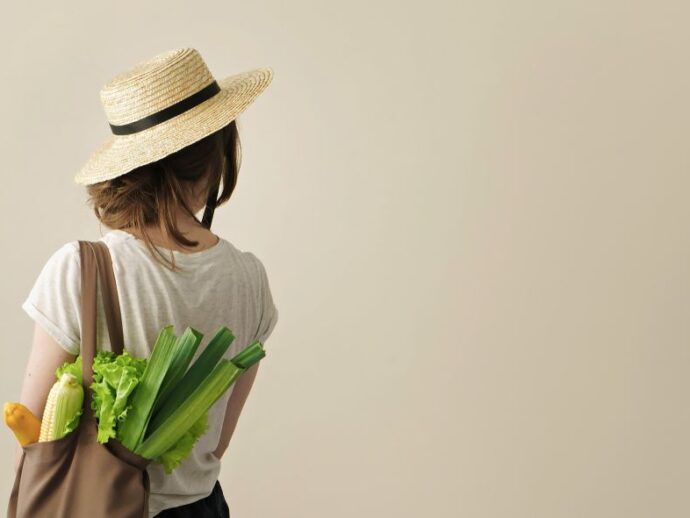
Happy New Year! Ringing in 2020 means it has been one year since I officially embarked on my Zero Waste (ZW) journey, attempting to drastically reduce my garbage, recycling, and food waste in an effort to be kinder to our planet.
If you’re looking for a way to be more eco-friendly (as well as save some money and live healthier), this may be the New Year’s resolution for you too! To make things simple, here’s a month-long plan for getting started on your own journey: 31 steps (one per day) to low waste.
Before we get started …
In October 2019, we published an article detailing the reasons we need to reduce our waste. Among them: we’re using up earth’s resources much faster than they can be replenished; recycling is a poor solution (only 9 percent of plastic gets recycled); and plastic waste is poisoning our waterways, their inhabitants, and us. Now we’re focusing on the “how?” of waste reduction.
6 ZW tips to get started
I can’t speak for every person trying to live in a low-waste way, but I can share some of the personal insights I’ve learned along the way.
1. Use it up!
Don’t toss your old products to buy flashy new “eco-friendly” ones: doing so would defeat the purpose. That likely means you’ll have to come back to several numbers on this 31-day plan at a later date—and that’s okay! If you’d like, research where and how to buy/make the replacement you’d eventually like.
2. Find what works for you
Going ZW is a personal journey, and not everything will work for every person. Maybe you love DIYs, or maybe you’d rather buy premade plastic-free products. Either way, you’ll find something that’s easiest and best for you.
3. Don’t get discouraged
In the words of Anne-Marie Bonneau (a.k.a. The Zero-Waste Chef), “We may never reach the zero in “zero waste” but that’s no reason to take zero action.”
4. It’s okay to make mistakes
It’s part of learning. From occasionally forgetting to ask for no straw to being caught on the go without my reusables, I still have ZW fails!
5. Know that these aren’t the only ZW actions
Far from it! Moreover, waste reduction is one way (but hardly the only way) to live sustainably. Plus, it’s often about weighing pros and cons. For example, depending on the scenario, it might be better to buy a local, organic product wrapped in plastic than to drive a long distance to a refill store.
6. Closing the loop
Fantastic news for us Canadians trying to go low-waste: Loop, by TerraCycle, is making its Canadian debut in 2020! I had the pleasure of interviewing Tom Szaky, founder and CEO of TerraCycle, to get the inside scoop.
“Loop is a new circular shopping platform aimed at eliminating waste and greatly improving the delivery, design, and features of products,” says Szaky. “The system is the first-ever global platform to partner with major brands and retailers with the objective of shifting from a disposable, where products end up usually in disposal and maybe recycling, to a durable supply chain, where packaging is always reused and product is either recycled or reused and manufacturers own their packaging in the long term. The consumers don’t own the package—instead just the product.”
As Szaky explains, “There is no waste with Loop since the containers will be cleaned and reused and consumers can put any plastic, such as protective seals, back into the tote for recycling.” The containers, which have refundable deposits, are then picked up by Loop, cleaned, and reused—and the cycle continues.
The Loop system is already active in the US and France, with great success. Interested? Sign up now at buydurable.com to be placed on the waiting list and alerted when Loop goes live. Then, the products will be available for purchase through the Loop website at loopstore.com.
The 31-Day Zero Waste Challenge
We recommend downloading this plan as a PDF. You can save it to your phone, or print it out as a visual reminder!
| Day | Category | Action | Consider… |
| Day 1 | Planning | Define your goals |
|
| Day 2 | Planning | Learn your recycling rules |
|
| Day 3 | On-the-go | Make an on-the-go kit |
|
| Day 4 | On-the-go | Prepare your lunches and snacks |
|
| Day 5 | On-the-go | Say no! |
|
| Day 6 | Bathroom | Choose ZW bathroom products |
|
| Day 7 | Bathroom | Choose ZW skin care |
|
| Day 8 | Bathroom | Choose ZW hair care |
|
| Day 9 | Bathroom | Choose ZW cosmetics |
|
| Day 10 | Bathroom | Choose ZW period products |
|
| Day 11 | Bathroom | Choose ZW oral care |
|
| Day 12 | Kitchen | Choose ZW food storage |
|
| Day 13 | Kitchen | Evaluate your diet |
|
| Day 14 | Kitchen | Choose unpackaged produce |
|
| Day 15 | Kitchen | Go bulk shopping |
|
| Day 16 | Kitchen | Cook/bake something |
|
| Day 17 | Kitchen | Compost |
|
| Day 18 | Others | Rethink gifts |
|
| Day 19 | Others | Refuse junk mail |
|
| Day 20 | Others | Choose ZW cleaning products |
|
| Day 21 | Others | Go ZW with laundry |
|
| Day 22 | Others | Visit your library |
|
| Day 23 | Others | Rethink paper products |
|
| Day 24 | New skills | Grow something |
|
| Day 25 | New skills | Repair something |
|
| Day 26 | New skills | Shop second-hand |
|
| Day 27 | New skills | Trade, barter, or borrow |
|
| Day 28 | New skills | Build your skills
|
|
| Day 29 | Thinking bigger | Tell others |
|
| Day 30 | Thinking bigger | Help your community
|
|
| Day 31 | Thinking bigger | Keep learning |
|
The waste hierarchy
Many of us focus on recycling, but recycling should really be seen as a last resort. Instead, follow “waste hierarchy”: rethink/redesign, reduce, reuse, recycle, and rot (compost). Other great “Rs” to follow: repurpose, repair, and refurbish.
Did you know?
If we continue at our current rate, scientists estimate there will be more plastic than fish (by weight) in our oceans by 2050.
Learn more!
- Bea Johnson: zerowastehome.com
- Anne-Marie Bonneau, “Zero Waste Chef”: zerowastechef.com
- Zero Waste Canada: zerowastecanada.ca
- Story of Stuff: storyofstuff.org
- Environmental Defence: environmentaldefence.ca/campaign/ending-plastic-pollution
Where to shop?
The website zerowastehome.com offers an international “bulk finder” tool. Natural health retailers often have extensive bulk sections and ZW goods too!
Leah Payne is a writer, editor, mom, and sustainability communicator. Follow her low-waste journey and learn about her work at leahstellapayne.com and Instagram.
A version of this article was published in the January 2020 issue of alive Canada with the title “31 Days to Low Waste.”







